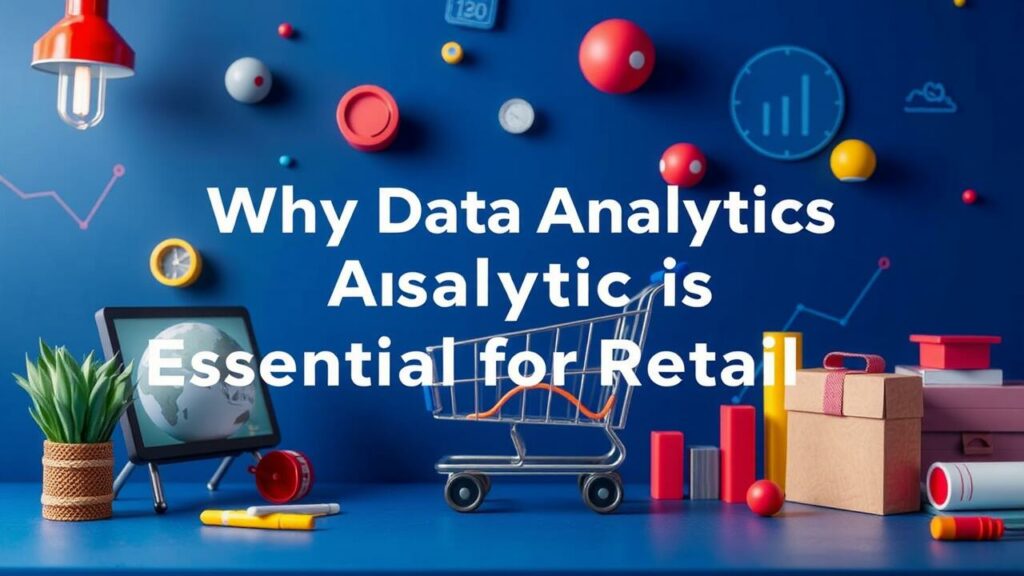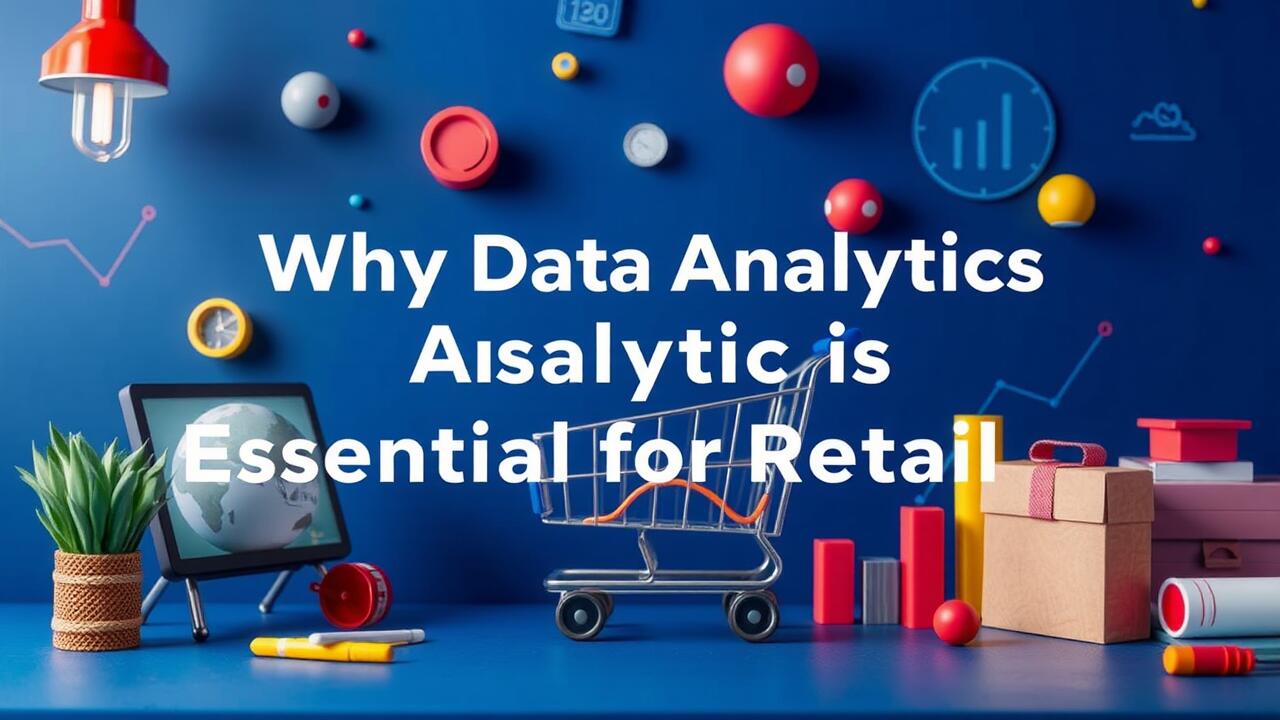Why Data Analytics is Essential for Retail
Table Of Contents
Why Data Analytics is Essential for Retail: Unlocking Success with Retail Data Analytics and Retail Analytics
Key Takeaways
- Significance of data analysis in commerce and its crucial role in the retail sector.
- Examination of strategies for analyzing retail information effectively.
- Effects of forecasting analytics in the retail industry on decision-making.
- Utilizing retail information to gain a competitive edge in the market.
- Obstacles faced when adopting analytical practices in retail environments.
Why Data Analytics Is Essential For Retail | Understanding the Importance of Data Analytics in Retail
Data analytics plays a crucial role in shaping the strategies of retail businesses by transforming vast amounts of market data into actionable insights. Why Data Analytics is Essential for Retail lies in its ability to empower retail companies to understand their customers better through customer analytics. By harnessing big data analytics and employing techniques like predictive analytics, retailing professionals can anticipate consumer preferences and trends, leading to more effective inventory management and marketing strategies. Prescriptive analytics further enhances decision-making processes within the retail industry, enabling businesses to optimize their operations and enhance customer satisfaction. In today’s competitive online retail environment, data analytics is not just an option but a necessity for success in the dynamic retail market.

Why Data Analytics is Essential for Retail | The Role of Data in Shaping Retail Strategies
Data analytics plays a crucial role in shaping retail strategies by providing insights that inform decision-making. Retailers, including online retailers and traditional retail shops, rely on data analysts to interpret complex data sets. This data analysis allows businesses to understand market trends, consumer behavior, and preferences. By harnessing business intelligence, retailers can effectively implement target marketing campaigns that enhance customer engagement and boost marketing ROI.
A data-driven approach allows retailers to adapt their strategies based on thorough market analysis. Understanding customer needs and preferences enables retail stores to optimize inventory management and product offerings. Effective data analytics also empowers retailers to predict shifts in consumer demand and adjust their strategies accordingly. This adaptability is vital in a competitive landscape where the ability to respond quickly to changing market trends can define success. Why Data Analytics is Essential for Retail cannot be overstated; it is fundamental in driving informed decisions and achieving sustainable growth.
Key Benefits of Implementing Retail Data Analytics
Implementing retail data analytics provides a significant advantage in understanding consumer behavior and preferences. Retail outlets can enhance their marketing strategies by effectively analyzing data collected from various sources. This allows retailers to tailor their offerings, ensuring they align with consumer research insights. Online retailers, especially, benefit from robust data storage solutions and databases that track consumer interactions, leading to more informed decisions that resonate with shoppers. Understanding why data analytics is essential for retail helps businesses leverage this information to drive sales and improve customer experiences.
Another key benefit is the improvement in data security and consumer privacy. Retailers must navigate the complexities of data collection while ensuring that consumer information remains protected. By focusing on data-driven approaches, companies can implement robust security measures that safeguard customer data. This commitment to data security not only fosters trust with consumers but also strengthens the brand’s reputation in a competitive marketplace. Ultimately, prioritizing effective retail data analytics equips businesses with the tools needed to thrive in both physical and online stores.
Exploring Retail Data Analytics Techniques
Understanding how to effectively utilize retail data analytics techniques is crucial for implementing a successful retail analytics strategy. Retailers must grasp why data analytics is essential for retail to enhance their marketing campaigns and optimize various marketing channels. By leveraging big data, organizations can analyze market demand and aggregate demand, allowing for more accurate sales forecasting. The integration of business intelligence (BI) tools strengthens retail analytics practices, enabling businesses to decode complex customer behaviors and preferences. Ultimately, effective retail analytics applications empower companies to align their strategies with market trends, ensuring they remain competitive in an ever-evolving landscape.

Overview of Retail Analytics Tools
Retail analytics tools are vital for maximizing the potential of retail data. Retail predictive analytics allows businesses to forecast customer behavior and market trends effectively. The integration of retail analytics software provides insights into merchandise performance, inventory management, and customer preferences. By utilizing data analytics, retailers can create targeted marketing strategies that enhance customer engagement and optimize their marketing ROI. With capable data analytics tools, businesses can generate detailed retail data reports, helping them make informed decisions and drive profitability.
In-store analytics play a crucial role in understanding shopper behavior and improving the customer experience. By collecting and analyzing retail data sets, retailers gain valuable data analytics insights that inform their strategies. Merchandise analytics enables businesses to track product performance and adjust their offerings accordingly. The effective use of retail advantage data helps companies stay ahead of competitors by identifying emerging trends and opportunities. Retailers that embrace these tools can unlock significant data analytics benefits, leading to sustained growth and customer loyalty.
Data Sources for Effective Retail Analysis
The integration of diverse data sources is crucial in establishing a strong foundation for effective analytics programs in retail. Complex analytics often demand a combination of internal and external data, allowing data-driven retailers to gain insights from various aspects of their operations. For instance, inventory analytics plays a vital role in optimizing stock levels, while marketing data provides an understanding of consumer behavior. Retail data solutions leverage these varied sources to feed into advanced data analytics tools, supporting businesses in making informed decisions.
Effective retail analysis relies heavily on harnessing both structured and unstructured data. Modern data analytics encompasses a broad spectrum of information, including sales transactions, customer feedback, and social media trends. Analytics refers to the systematic examination of these data points to identify patterns and leverage insights. By utilizing analytics solutions that incorporate external data analytics, retailers can improve their understanding of market trends and customer preferences. This multifaceted approach not only enhances their strategies but also underscores why data analytics is essential for retail growth and sustainability.
Impact of Retail Predictive Analytics
Predictive analytics plays a pivotal role in shaping effective retail strategies by harnessing the power of consumer data and in-store sales data. Why Data Analytics is Essential for Retail lies in its ability to transform this data into actionable insights that empower retail organizations. Through modern analytics programs, retailers can leverage self-service analytics to quickly assess trends and patterns. Descriptive analytics aims to summarize historical data, while diagnostic analytics delves deeper into understanding the reasons behind trends. By employing predictive analytics results, organizations can forecast future performance, enabling them to make informed decisions within a retail context. Utilizing a retail data cloud enhances the capability to process vast amounts of information, ultimately driving success in a highly competitive retail market.
Enhancing Customer Experience with Predictive Models
The retail industry generates vast amounts of sales data that can significantly enhance customer experience. Retail allows businesses to embrace data analytics, enabling retail managers to utilize customer-centric data for personalized marketing strategies. By leveraging a robust retail analysis platform, retailers can dissect real sales data and uncover data insights that help tailor their offerings to meet customer preferences. This level of customization not only fosters loyalty but also drives higher engagement levels among consumers in the retail world.
Predictive models play a crucial role in shaping data-driven pricing strategies, which directly impact customer perceptions and buying behavior. Understanding why data analytics is essential for retail empowers businesses to anticipate customer needs and provide timely services that differentiate them from competitors. As the retail sector becomes more competitive, the ability to analyze past trends and behaviors will allow retailers to predict future demands, ensuring they remain relevant in a rapidly evolving marketplace.
Forecasting Trends and Sales Performance
Effective forecasting of trends and sales performance is pivotal for retailers aiming to enhance their market adaptability. Data analytics plays a crucial role in driving this process. By analyzing relevant data, including point-of-sale data and consumer behavior patterns, retailers can create accurate customer profiles. This comprehensive understanding allows businesses to tailor their retail offers and promotions, aligning closely with evolving marketing objectives. The integration of third-party data marketplaces elevates this analysis by providing additional insights into consumer trends, ensuring that retailers stay ahead in an ever-changing market.
Utilizing retail data analytics enables companies to anticipate consumer demand and optimize inventory management. Retailers who leverage sales data and consumers’ online research habits can predict which products will resonate in the market. This proactive approach leads to the development of targeted advertising strategies that enhance exceptional shopping experiences. The insights derived from data not only inform current promotions but also shape future offerings, demonstrating why data analytics is essential for retail in today’s competitive landscape.
- Utilizing historical sales data to identify seasonal trends and fluctuations.
- Implementing predictive analytics tools to forecast future sales and inventory needs.
- Conducting regular market research to stay informed about consumer preferences and emerging trends.
- Collaborating with supply chain partners to ensure timely product availability based on forecasted demand.
- Adjusting marketing strategies based on real-time analytics to enhance customer engagement.
- Monitoring competitors’ strategies to adapt and refine the forecasting approach.
- Investing in training for staff to effectively utilize data analytics tools and practices.
Leveraging Retail Data for Competitive Advantage
Retailers recognize that data analytics is essential for retail strategies, enabling them to harness insights from various retail touchpoints. By utilizing business intelligence solutions and big data tools, merchants can develop targeted marketing campaigns tailored to customer preferences. This capability assists store managers in making data-driven decisions that enhance the customer experience. Many data projects rely on comprehensive data reports to guide these efforts, allowing stores to implement personalized marketing strategies. By understanding consumer behavior and market trends, retailers can effectively optimize their operations and maintain a competitive advantage in fast-paced retail environments.
DataDriven Decision Making in Retail Management
Data analytics plays a crucial role in shaping retail strategies by enabling operators to develop informed customer profiles. By leveraging customer segmentation data, retailers can tailor marketing investments to target need-based shoppers more effectively. This approach not only maximizes the potential for conversions but also enhances the overall shopping experiences for customers. Retailers that implement accurate product inventory systems, supported by new data sources, can respond to customer preferences promptly, making their operations more efficient.
The ability to predict customer likelihood based on data-driven goals is transforming how retail management functions. Retail operators can assess the effectiveness of their marketing department through successful data projects, allowing for continuous optimization. By focusing on individualized shopping experiences, many businesses are finding ways to drive customer engagement and loyalty. This shift towards data-informed decision-making underscores Why Data Analytics is Essential for Retail, leading to improved performance across various aspects of the business.
Case Studies of Successful Retail Data Applications
Leading retailers increasingly recognize why data analytics is essential for retail. Companies like Target have utilized careful data analysis to enhance personalized shopping experiences. By leveraging their own data, they can create tailored marketing strategies that resonate with customers. This approach not only improves customer satisfaction but also drives sales. Shop managers can monitor retail KPIs more effectively, ensuring that promotions are aligned with customer expectations and preferences.
Walmart’s implementation of effective demand forecasting serves as another example of successful data application in retail. By integrating traditional data storage systems with advanced analytics, they can predict customer needs with impressive accuracy. This enables them to streamline inventory management and optimize their in-store experience. In a challenging retail landscape, organizations facing competition can use precise business insights derived from their organizational data to stay ahead of trends and adapt to changing consumer behaviors.
| Retailer | Data Application | Outcome |
|---|---|---|
| Target | Personalized Shopping Experiences | Increased Customer Satisfaction and Sales |
| Walmart | Demand Forecasting | Improved Inventory Management |
| Amazon | Recommendation Algorithms | Higher Conversion Rates |
| Best Buy | Price Optimization | Competitive Pricing Strategy |
Challenges in Implementing Retail Analytics
Implementing retail analytics presents various challenges that retailers must navigate to leverage the full potential of data. Retail conglomerates often struggle to identify customers accurately and analyze consumer purchasing trends effectively. Sales details can be overwhelming, making it difficult for marketing teams to create optimized reports that enhance the shopping experience. Merchants may face hurdles in developing personalized marketing campaigns that resonate with their target audience. Without a clear data-driven vision, understanding customer purchase behavior becomes complex, hindering the formulation of effective marketing strategies. These challenges underscore why data analytics is essential for retail, as overcoming them is crucial for gaining a competitive edge in the market.
Common Obstacles Retailers Face
Retailers often struggle with integrating entry-level business intelligence into their operations, which is crucial for maximizing the benefits of data analytics. Many lack the infrastructure to effectively gather historical sales data and actionable insights. This can hinder their ability to enhance product visibility and tailor marketing efforts to meet evolving customer needs. Without a clear understanding of shopping patterns and relevant data points, store managers may find it challenging to drive meaningful business outcomes. Understanding these company-specific factors is part of why data analytics is essential for retail.
Data protection issues present another significant hurdle for retailers. Compliance with general data protection regulations can complicate the collection and analysis of customer purchase histories. Retailers need to balance the collection of relevant data points with safeguarding customer information. Failure to do so can limit their ability to adapt to industry trends and improve the overall shopping experience. The intersection of compliance and data analytics emphasizes the need for a strategic approach to harnessing retail data effectively.
- Retailers may struggle with outdated technology that limits data access and analysis.
- Employee training on data usage and analytics tools is often insufficient.
- Competition from e-commerce platforms makes it challenging to retain customer loyalty.
- Limited understanding of customer segmentation can lead to ineffective marketing strategies.
- Financial constraints might restrict investments in necessary technology and infrastructure.
- Difficulty in predicting consumer behavior can result in overstock or stockouts.
- Retailers may face resistance to change from staff accustomed to traditional methods.
Conclusion
Data analytics plays a crucial role in shaping retail strategies, highlighting why data analytics is essential for retail. By leveraging insights from consumer behavior, retailers can implement dynamic pricing strategies that optimize sales while enhancing customer satisfaction. Effective analytics allow for the crafting of tailored marketing messages that resonate with target audiences, ensuring that retailers not only attract but also retain valuable clients. Personalized product recommendations based on data-driven insights foster a shopping experience that feels unique and relevant to each consumer. Emphasizing the importance of analytics empowers retailers to navigate an increasingly competitive landscape successfully.
FAQS
How can data analytics enhance the services that differentiate businesses in the retail market?
Data analytics enhances the services that differentiate businesses by providing insights derived from consumer research. By utilizing data analytics, businesses can understand customer purchase behavior and preferences, which empowers them to tailor their retail promotions effectively. Additionally, data analytics allows businesses to optimize their marketing ROI by allowing them to conduct accurate demand forecasting and manage the challenges businesses face in the retail industry functions. This precise business use of data helps stores adapt and meet the evolving needs of consumers who research online.
What are the benefits of utilizing data analytics in the retail market to assist merchants in understanding consumers’ research online?
Utilizing data analytics in the retail market empowers merchants by providing insights into consumers’ research online. This data-based approach allows stores to tailor their services and differentiate their businesses effectively. Analytics focuses on critical trends and behaviors, assisting in creating data-driven strategies that meet consumers’ needs and enhance overall shopping experiences. By analyzing data, merchants can better understand what consumers are looking for, thereby making informed decisions that ultimately improve service offerings in a competitive landscape.
How does data analytics assist merchants in understanding consumers’ research online and differentiate services in the retail market?
Utilizing data analytics allows stores to analyze data—something that is crucial for understanding consumers’ research online. By leveraging data based insights, merchants can identify trends and preferences, which assists them in enhancing the services that differentiates businesses from their competitors in the retail market. Furthermore, this analytical approach helps merchants to make informed decisions on the things that allow stores to succeed.
How can data analytics help improve the way stores understand consumers’ research online and the services that differentiate businesses in the retail market?
Data analytics is essential because it allows stores to analyze consumers’ research online, providing insights into shopping behaviors. This data can be utilized by merchants to improve their services, helping them better understand what consumers are looking for. By utilizing data analytics, businesses can identify trends and preferences, assisting merchants in making informed decisions that enhance their overall strategy. This data—the cornerstone of effective retail marketing—allows stores to tailor their offerings, ultimately differentiating their services from competitors.
How can utilizing data analytics provide insights into consumers’ research online and enhance services that differentiates businesses in the retail market?
Utilizing data analytics allows stores to gain valuable insights into consumers’ research online, assisting merchants in understanding the things that drive consumer behavior. This data something enables businesses to tailor their services, which ultimately differentiates them in the competitive retail market.
How can the things that allow stores to utilize data analytics assist merchants in differentiating their services based on consumers’ research online?
Utilizing data analytics allows stores to gain insights into consumers’ research online, which can assist merchants in tailoring their services to meet the unique preferences of shoppers and differentiate businesses in the retail market. This enables retailers to stay competitive by adapting their offerings based on consumer behavior and preferences.
How do the tools that allow stores to utilize data analytics help in understanding consumers’ research online and enhance the services that differentiates businesses?
The tools that allow stores to utilize data analytics provide valuable insights into consumers’ research online, helping merchants comprehend buying patterns and preferences. By analyzing this data, businesses can enhance the services that differentiates them in the competitive market, ensuring they meet consumer needs more effectively.
In what ways can the things that allow stores to effectively utilize data analytics improve their understanding of consumers’ research online and contribute to the services that differentiate businesses?
The things that allow stores to utilize data analytics can significantly enhance their understanding of consumers’ research online by providing insights into purchasing behavior and preferences. This enables retailers to tailor their offerings and refine their marketing strategies, ensuring that the services they provide truly differentiate businesses in a competitive market. By leveraging data analytics effectively, stores can gain a clearer picture of consumer needs and adjust their services accordingly, ultimately leading to greater customer satisfaction and loyalty.
What are the different ways in which things that allow stores to utilize data analytics can provide insights into consumers’ research online and improve services that differentiate businesses?
The things that allow stores to utilize data analytics can be instrumental in gaining insights into consumers’ research online. By effectively analyzing data, stores can tailor their services to meet the needs of their customers, which greatly enhances the services that differentiates businesses. Additionally, understanding patterns in consumers’ research helps in refining marketing strategies and optimizing inventory, ultimately leading to an improved customer experience and increased sales.
In what ways do the things that allow stores to utilize data analytics impact how businesses differentiate their services based on consumers’ research online?
The things that allow stores to utilize data analytics significantly enhance their ability to understand consumers’ research online, leading to improved services that differentiates businesses. By leveraging data analytics, retailers can gain insights into consumer behavior, preferences, and trends, ultimately optimizing their offerings to better meet consumer needs. This approach not only allows them to effectively respond to the insights gained from consumers’ research but also positions them to create unique and appealing services that stand out in the competitive market.






